
Welcome to The Global Health Network Asia Diary of Events and Activities
February 2023 | May 2023 | July 2023
November 2022 | October 2022 | August 2022 | June 2022 | May 2022 |
July 2023
Topic: Introduction to R in Epidemiology
The Global Health Network (TGHN) Asia has set up a Data Science club in icddr,b, Bangladesh. As part of the first two sessions, TGHN, in collaboration with HDR UK, icddr,b, Fiocruz, and Africa CDC organized a hybrid workshop on Introduction to R in Epidemiology on July 17 & 18, 2023 to deliver training in the R statistical package for aspiring epidemiologists. The goal of the two-day programme was to make R training more accessible and tailored to the broader communities of practice in the Global South.
Participants joining the two sessions learned about introductory R topics such as syntax, data cleaning, and basic data analysis and visualization. A total of 37 participants attended the sessions, including 15 who joined virtually from 6 different countries, and 22 young researchers joined in person from institutions in Bangladesh.
Programme
Saimul Islam, Senior Research Investigator, Non communicable Diseases, NRD, icddr,b moderated the whole session. Mathew Redford from HDR Global gave the opening remarks, where he introduced the participants to the Global Health Data Science knowledge community and hub, the concept of Data Science Clubs and Clinics, networking with researchers, and availability of relevant tools. He also presented on the Data Science hub’s initiative to make health data more accessible and future initiatives to incorporate Artificial Intelligence and Machine Language in health research.
Aashna Uppal, an expert data scientist, and a candidate of the HDRUK-Turing-Wellcome PhD Programme in Health Data Science at the University of Oxford, facilitated the training. On the first day, participants were introduced to Applied Epidemiology and ‘R and RStudio’. Then, they were taken to the R studio environment. In the duration of the first session, different functions, packages, calculations, using working directory, creating R projects, and R syntax were touched upon. Next, they learned about class of objects, indexing and took part in practice exercises.
 |
 |
The second day began with a brief session to address any queries regarding topics of the previous day. The training was then moved to exposing the participants with real working challenges. Base R vs Tidyverse coding conventions, how to import data and packages, basic data manipulation, and data cleaning using RStudio were discussed. In the next segment of the session, creating tables, data visualization, R markdown and automated reporting features were introduced.
In the closing remarks, Dr. Aliya Naheed, lead of TGHN Asia and scientist, Noncommunicable Diseases, Nutrition Research Division, engaged the participants sharing her real experiences of data management challenges. She encouraged the participants to go forward with their research career with effective communication with institutional and global communities. Moreover, she emphasized on practicing the demonstrated topics for effective learning.
The participants shared how useful they found the two sessions and learned a lot from the training provided. An in-person-participant showed interest in doing more of this hands-on workshop, while a virtually participant from Cambodia expressed her initiative to incorporate R/Rstudio in their mixed methods study analysis.
Feedback from the survey participants will be implemented moving forward. For example, future cohorts may be separated based on skill level, and the length of the workshops may be increased to spend more time on material covered. Participants may also be asked beforehand if they have specific requests for intermediate and advanced topics, and the team will try to run workshops in participants’ mother tongue where possible (although it was noted that running these workshops in English was not a barrier to learning). As well, a key recommendation would be to ground all learning in practical examples; having practical examples could not only encourage discussion, but solidify learning. Lastly, given feedback received, it is recommended to follow up with participants at higher skill levels to gauge whether they would be interested in undertaking a “training of trainers” course, whereby they learn how to run Data Clubs and Clinics themselves. This would ensure sustainability in maintaining this learning platform over the long term.
Please visit the video link for more information on the Data Science Club:
|
Introduction to R for Epidemiology - Session 1
|
Introduction to R for Epidemiology - Session 2
|
 |
May 2023
TGHN Asia conducted webinar on “Introduction to Ethics in Research”
The Global Health Network organized a hybrid webinar on “Introduction to Ethics in Research” that was held on May 30 at 3.0 PM BST. This session was conducted under the project “A New Ecosystem for Health Research & Data Science” and hosted by The Global Health Network Asia. The aim of the webinar was to provide participants with a fundamental understanding of research ethics. Attendees learned about the basics of ethics, informed voluntary consent, the fundamental principles of ethics, and the evaluation of ethical issues in health research. A total of 173 participants attended the session, including 143 who joined virtually and around 30 who joined in person. Dr. Salvia Zeeshan, the Regional Manager for The Global Health Network Asia described the aim of the hub which is to improve health research capacity in Asia through a variety of programs, including learning modules, workshops, and mentorships. She also mentioned that TGHN Asia will support the strengthening of capacity for grant management, finance, and project management for health research. The hub is currently supporting the establishment of research clubs, data science clinics, workshops, and mentorship programs.
Dr. Aliya Naheed, scientist, icddr,b and regional lead, The Global Health Network Asia was the key speaker in the sessions and delivered talk on “Introduction to Ethics in Research”. Dr. Naheed emphasized the importance of ethical considerations, such as respecting humanity, prioritizing participants' interests over researchers', ensuring participants' autonomy, and promoting beneficence towards them. She also touched upon the significance of maintaining confidentiality, privacy, and obtaining informed written consent from participants. Dr. Naheed share her extensive experience in various ethical provisions. The webinar concluded with a question-and-answer session, allowing participants to engage and gain further insights into ethical considerations in research.
During the question and answer session, participants share experience and asked difference questions. For example, one researcher asked that how to effectively communicate the time constraints and potential impact of delayed approvals from the research ethics board without undermining ethical review, drawing on their academic and professional background. The speaker advised researchers to be respectful and try to understand the concerns raised by the ethics board. They suggested being attentive to the issues raised and honestly addressing what can and cannot be addressed. Additionally, researchers can ask the ethics board for suggestions on how to solve specific problems. If a logical argument is required, strong references and background information should be provided. In cases of lack of understanding, setting up a meeting with the chair or director of the ethics committee can help clarify concerns.
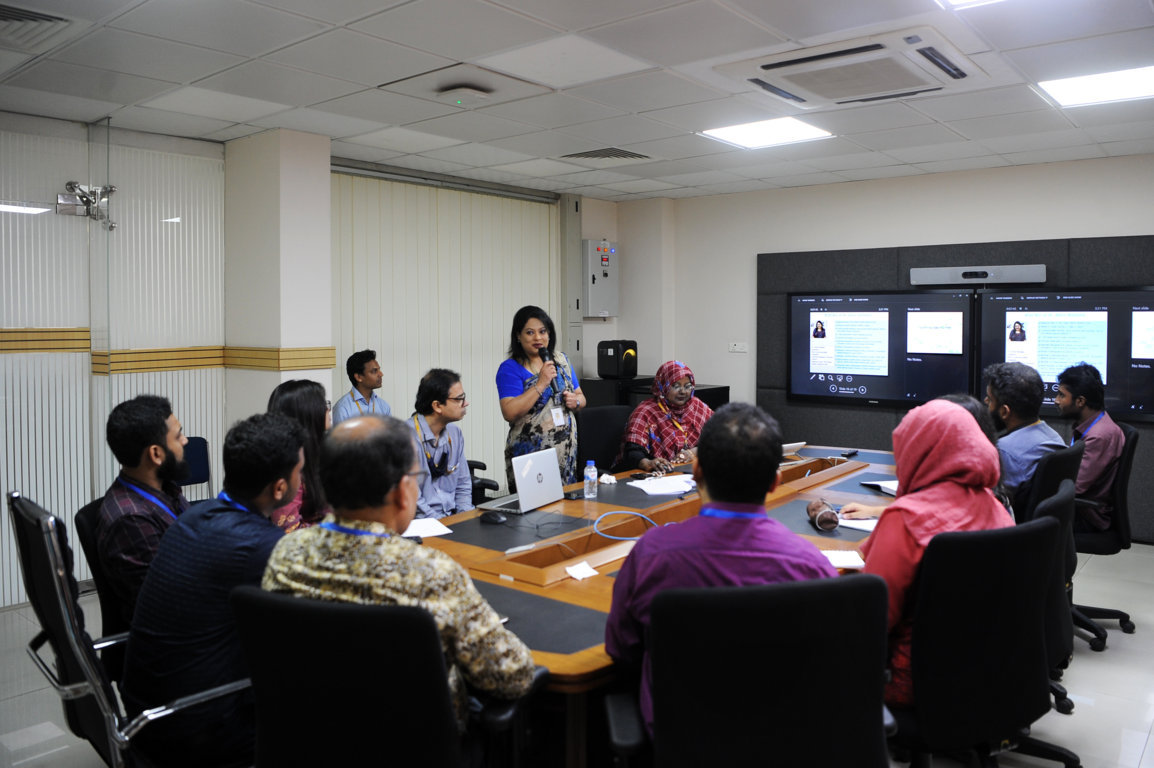 |
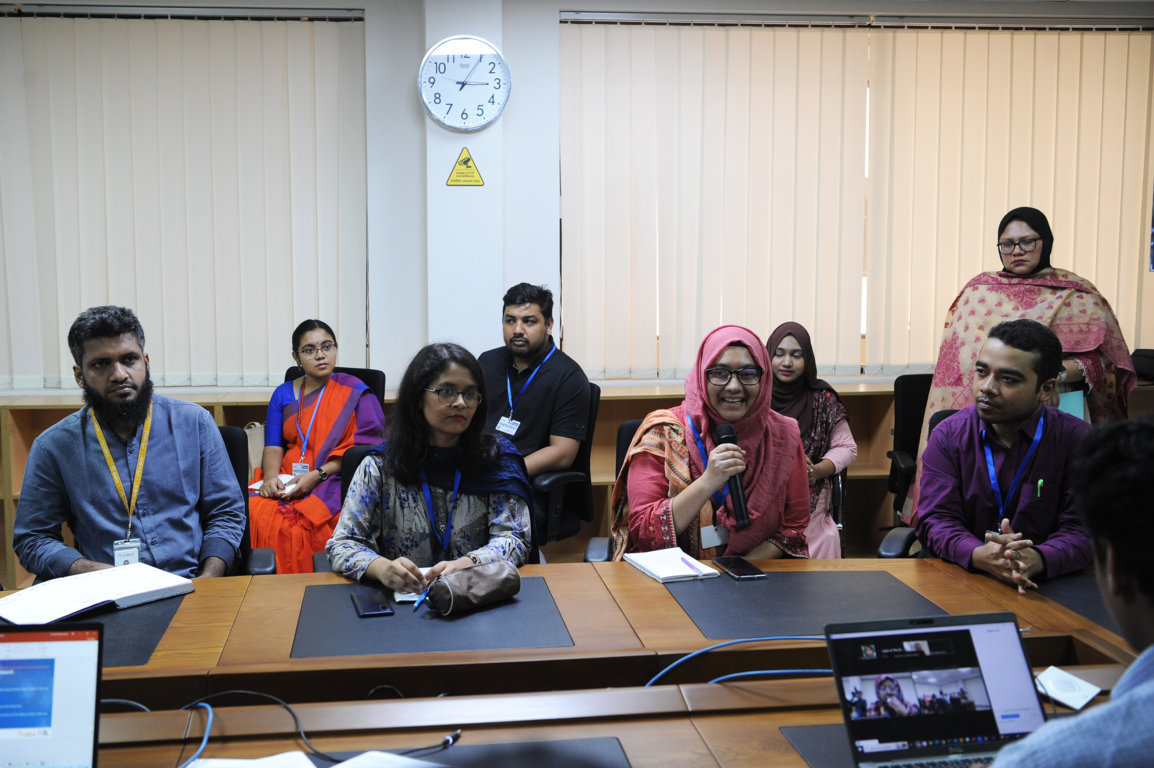 |
February 2023
TGHN Asia conducted seminar on “How to develop an analytical plan for a research project- the gateway of writing a manuscript”
The Global Health Network Asia (TGHN Asia) organized a seminar on “How to develop an analytical plan for a research project- the gateway of writing a manuscript” that was held on 23rd February 2023. This session was conducted under the project “A New Ecosystem for Health Research & Data Science” and hosted by icddr,b. Objective of the session was to give an overview on developing an analytical plan for research projects. Individuals from diverse backgrounds including public health researchers and clinicians from national institutes attended the event. Amongst the 150 participants of the hybrid seminar, about 90 of them joined in-person. The seminar was facilitated by Dr. Aliya Naheed, Scientist, Initiative for Non-Communicable Diseases, Regional Lead, The Global Health Network Asia, Health Systems and Population Studies Division, icddr,b. The seminar began with a brief introduction of The Global Health Network Asia by Dr. Salvia Zeeshan, Regional Coordinator, The Global Health Network Asia.
The main feature of the session was the interactive session where all participants had an opportunity to ask questions. The questions were mostly on the analytical plan, strategies to prepare a high level outline and starting point of writing manuscript. The attendees left positive remarks about the seminar and mentioned how the knowledge gained from the event will help them select an appropriate analytical plan for their research and develop conceptual frameworks. They were also excited seeing the highlights of The Global Health Network Asia and felt that this was a gateway for writing research protocol and manuscript.
TGHN Asia plans to conduct more workshops on a priority basis at national and global level for building research capacity and leadership in the Asian region. All the participants showed their interest to be connected with the platform to improve their professional skills and enhance their networking capacities.
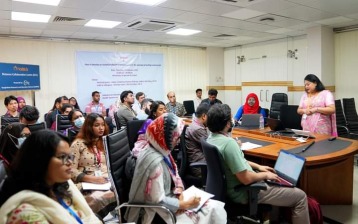 |
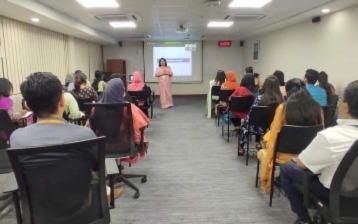 |
November 2022
The Global Health Network Conference 2022 at University of Cape Town, South Africa
Dr. Aliya Naheed, Scientist, Initiative for Non-Communicable Diseases and Regional Lead, The Global Health Network Asia, HSPSD along with five team members of Initiative for Non-Communicable Disease: Mr. Saimul Islam, Mr. Nantu Chakma, and Dr. Noshin Farzana, Research Investigators Mr. AKM Emdadul Haque, Senior Administrative Officer, and Mr. Shawkat Jahangir, Data Management Officer, Initiative for Non-Communicable Diseases, HSPSD attended The Global Health Network Conference from 22nd -26th November, 2022.
Meeting with Bill & Melinda Gates Foundation on 22nd November,2022
Dr. Aliya Naheed, Scientist, Initiative for Non-Communicable Diseases and Regional Lead, The Global Health Network Asia, HSPSD was invited by the Bill & Melinda Gates Foundation to attend the Data Sciences Grand Challenges Annual meeting that was held on 22nd November, 2022. The team discussed progress on networking within different collaborators and upcoming strategies to enhance visibility of the project across Asia, Africa and Latin America.
Symposium of the Global Health Network Conference on 23rd November, 2022
Dr. Aliya Naheed attended the AMR Knowledge Hub Symposium. Tackling AMR: How implementation research is vital in a One Health approach. AMR is arguably the most significant threat to health across the world. Other members of the INCD team were present.
Meeting of the Global Health Network Asia on 23rd November, 2022
An informal lunch meeting with the team of The Global Health Network Asia was held on 23rd November, 2022. The meeting was attended by the regional lead of TGHN Asia and coordinators from Bangladesh, India, Nepal, Pakistan, Sri Lanka and Philippine. The team introduced themselves and planned for further meetings to increase the visibility and networking of TGHN Asia.
 |
Meeting of the Global Health Data Science knowledge hub on 24th November, 2022
On 24th November 2022, an informal side meeting of the Global Data Science Hub was held at The Global Health Network Conference in Cape Town, South Africa. During the lunch break, working group members and collaborators from Asia, Africa, Latin America and the Caribbean attended the meeting. Attendees introduced themselves, their places of employment, and their positions within the current project and research. Please visit the link for more information on the Global Health Data Science Hub: https://globalhealthdatascience.tghn.org/
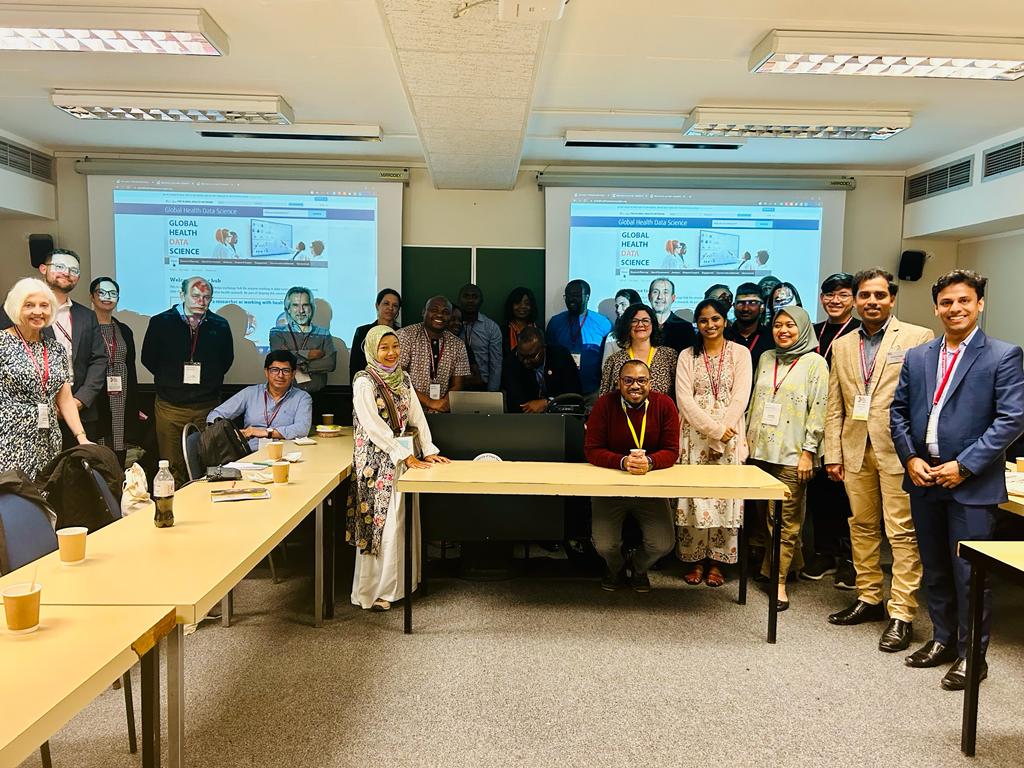 |
Scholarship for the poster presentation at TGHN Conference, 2022
Mr. Saimul Islam, Mr. Nantu Chakma, and Dr. Noshin Farzana, Research Investigators of the Initiative for Non-Communicable Diseases, HSPSD received individual scholarship for poster presentation at The Global Health Network Conference 2022 that was held at the University of Cape Town, South Africa. Mr. Nantu Chakma and Dr. Noshin Farzana presented their abstracts in the conference for the “Engaging the Community in Every Step of the Research Cycle” session on 24th November 2022. Mr. Saimul Islam also presented his abstract for the “Generating New Evidence from Linkage Database Related to Health” session on 25th November 2022.
Day 1: Enabling Health Research in Every Healthcare Setting, University of Cape Town, South Africa
On 24th November, 2022 Dr. Aliya Naheed opened session 2 on “Enabling Health Research in Every Healthcare Setting, University of Cape Town, South Africa” with a plenary talk on health systems in Bangladesh and the importance of embedding skills and supporting the whole research cycle. The session was chaired by Prof. John Reeder (WHO); highlighted on implementing tobacco control strategies in India and achieving improved access to youth-friendly sexual reproductive health and rights services in Nigeria. With other Key regional leaders, Dr. Aliya Naheed made the official announcement of the launch of The Global Health Network Asia.
 |
Day 2: Women in Research
On 25th November, a special session on Women in Research Panel was conducted by TGHN, chaired by Dr Iris Mwanza (Bill & Melinda Gates Foundation), the panel featured Dr. Lyda Osorio (Universidad Del Valle), Prof. Cristiani Vieira Machado (Fiocruz), Dr. Aliya Naheed (icddr,b), Prof. Thumbi Ndung’u (Africa Health Research Institution), Dr. Alice S Lakati (Amref Health Africa) and Katherine Littler (WHO). Dr. Mwanza opened the session by announcing the launch of the Women in Global Health Research community of practice on The Global Health Network and emphasising the need to “accelerate our goals in gender equity” not only because it is the right thing to do, but also because better equity in health research creates “better health outcomes for all of us”. Dr. Naheed in her speech highlighted the importance of early intervention and supporting girls to pursue science and education at a young age while also mentoring young female health researchers once they reach the early stages of their careers. She further encouraged all the women researchers to be a part of this global platform to chase their dream into reality by learning by doing modality. Conference videos link: https://www.youtube.com/playlist?list=PLFeCICGbdRd6zYdIN4C4rgHc7SMnWbWBe
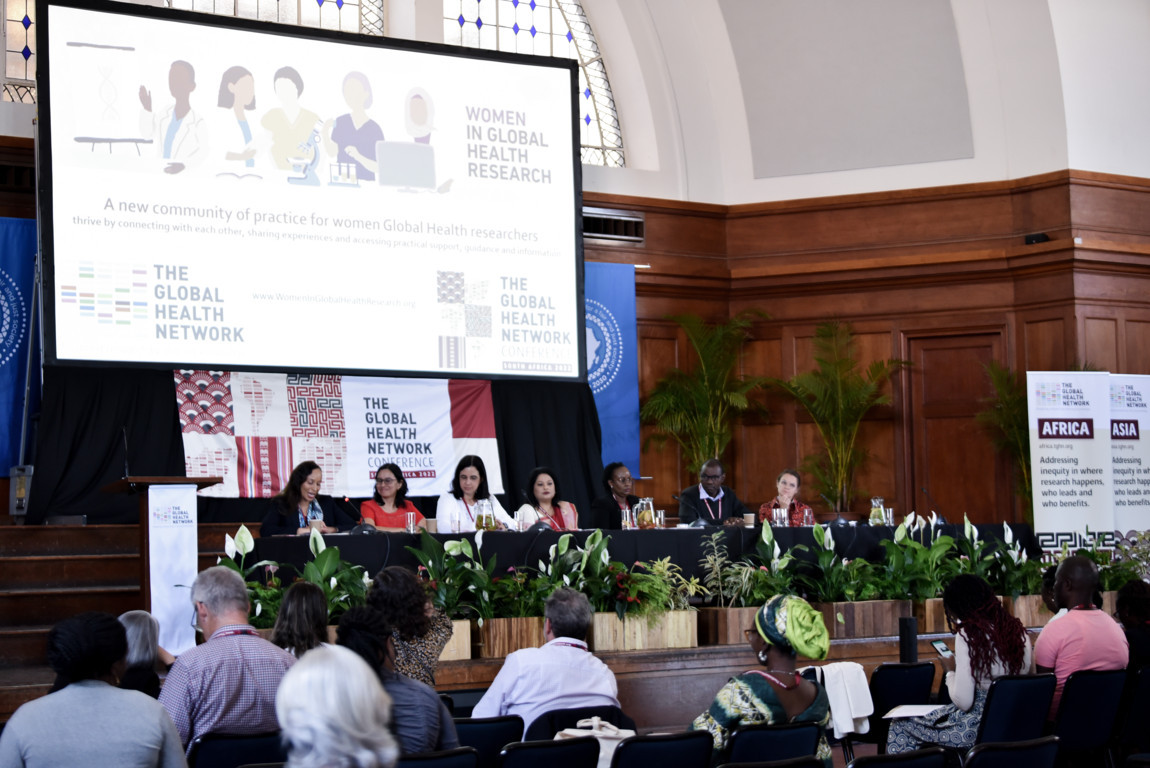 |
October 2022
Dissemination of the 2nd National Micronutrient Survey, Bangladesh 2019-2020
Children and women substantially suffer from multiple micronutrient deficiencies - Vitamin D deficiency among women of reproductive age is alarmingly high. The National Nutrition Services (NNS) of the Institute of Public Health Nutrition (IPHN), Directorate General of Health Services (DGHS), in partnership with icddr,b organised the dissemination of the 2nd National Micronutrient Survey, Bangladesh 2019-2020 on October 30, 2022. The survey was carried out to understand the status of vitamin A, Vitamin D, Zinc, Ferritin, Urinary Iodine and Anaemia among children (5 to 59 months) and non-pregnant and non-lactating (NPNL) women of reproductive age (15-49 years). Additionally, Vitamin B12 and Folate in NPNL women were also assessed. This nationwide survey was conducted in 250 Upazilas which were randomly selected from every district of eight divisions identified by the Bangladesh Bureau of Statistics.
Study highlights
The findings suggest that children under five years of age, and non-pregnant and non-lactating women in the country still significantly lack micronutrients.
Among the under-5 children, deficiency in minerals accounts for 31% had zinc deficiency, 20% had iodine deficiency, and 15% had iron deficiency. While in the case of vitamins, 22% had vitamin D deficiency, and 7% of children had moderate vitamin A deficiency. Compared to the findings from the 1st National Micronutrients Survey 2011-12, the prevalence of micronutrient deficiency status improved for three indicators (vitamin A, Zinc, and vitamin D) while the iron level declined. The prevalence of iodine deficiency (20%) in children has been reported for the first time in this survey.
Among the non-pregnant and non-lactating women, 43% had zinc deficiency, 30% had iodine deficiency, 29% had folate deficiency, and 14% had iron deficiency. An alarming 70% of NPNL women lacked vitamin D, 20% had vitamin B12 deficiency, and only 7% of women had mild vitamin A deficiency. Compared to the findings from the 1st National Micronutrient Survey 2011-12, the micronutrient deficiency status among NPNL women showed improvement in three indicators (vitamin A, zinc, iodine), worsened in thee indicators (serum iron, Folate), and remained unchanged in vitamin D and vitamin B12.
Additionally, 21% of children and 29% of non-pregnant and non-lactating women had mild to severe anaemia in the current survey.
Dr Mustafizur Rahman, Director, DGHS and Line Director, NNS delivered the welcome speech and expressed his heartfelt gratitude to the survey team of icddr,b for the successful completion of the survey amidst the COVID-19 pandemic. He also said that this national estimate of micronutrient deficiency would direct the implementation plan of micronutrient supplementation programs of NNS for children and non-pregnant and non-lactating women.
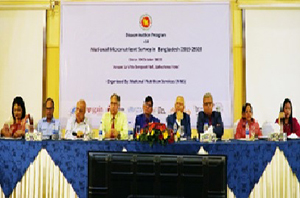 |
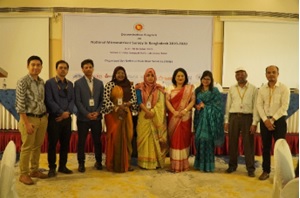 |
Dr Aliya Naheed, PI of the study said, "The National Nutrition Services has done a commendable job by supporting icddr,b to conduct high-quality nutrition research in Bangladesh despite the unprecedented challenges of the COVID-19 pandemic. We have identified which vitamins and minerals children and women lack in, and our study findings give a newer direction for the policymakers to design the next-generation nutrition programmes in the 5th health sector programme in Bangladesh. However, monitoring the performance of the nutrition programme would be critical for making policy decisions and the research infrastructure developed by icddr,b has created a wonderful opportunity for the NNS to generate essential evidence for designing cost-effective programmes for improving the health and well-being of people in Bangladesh."
Dr Tahmeed Ahmed, Executive Director at icddr,b appreciated the government's decision and commitment to carrying out the survey and said, "I am confident that the results of the survey will help prepare a strategy for combating food and nutrition insecurity and to identifying appropriate interventions."
Mr Syed Mojibul Huq, Additional Secretary (Public Health Wing), Health Services Division, Ministry of Health and Family Welfare, graced the session as the Chief Guest. He appreciated the National Nutrition Services and icddr,b for bringing out some important findings. He expressed his interest in seeing the evidence turned into actions and addressing the deficiencies in vitamins and minerals in children in women.
Among others, Mr Jashim Uddin Khan, Deputy Secretary (Public Health), Health Service Division, Ministry of Health and Family Welfare (MoHFW); Dr Hasan Shahriar Kabir, Director General, Bangladesh National Nutrition Council; Prof. Tahmina Begum, President, Bangladesh Neonatal Forum; Prof. Dr Khaleda Islam, Director, Institute of Nutrition& Food Science (INFS), Dhaka University; Dr Malay Kanti Mridha, Professor, BRAC university, Prof. Dr S K Roy, Bangladesh Breast Feeding Foundation; Shaiqa Siraj, Country Director, Nutrition International, Dr Ferdousi Begum, ICMH, Matuail; Rudaba Khondker, GAIN international; Ms Faria Shabnam, National Officer, WHO Bangladesh; Ireen Akhter, Unicef Bangladesh also spoke at the seminar. The dissemination session was hosted by The Global Health Network Asia and attended by representatives from DGHS, IPHN, development partners, UNICEF, WHO, icddr,b and media.
August 2022
Meeting with faculties of the University of Asia Pacific
The Global Health Network, Asia team conducted a brainstorming meeting with faculties of the University of Asia Pacific (UAP). The meeting was chaired by Professor. Dr. Qumrul Ahsan, Vice Chancellor, UAP. Faculties from different departments including the Director of the Institute for Energy, Environment, Research and Development (IEERD), Department of Pharmacy, and Department of Computer Science and Engineering (CSE) attended the meeting. The faculties highlighted their existing research work, shared experiences of proposal writing, and showed their further interest in the capacity strengthening of students and faculties to conduct quality research for public health benefit. Dr. Aliya Naheed, Regional Lead, The Global Health Network, Asia shared briefly about the training resources and opportunities offered by the TGHN platform, and further scopes of collaboration, networking, and need-based skill-building actions.
Next planning
- Conduct a short survey among the faculties to learn the major obstacles in research and assess their capacity need and requirement
- Arrange a meeting between the data-science hub of TGHN Asia and the Department of CSE, UAP to explore existing activities of data science at UAP
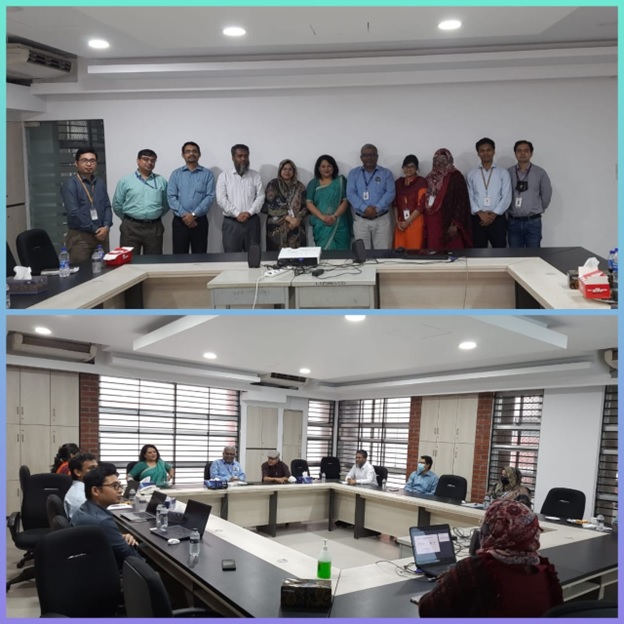
Learn more about the University of Asia Pacific
June 2022
Workshop on Grant Writing
Dr. Aliya Naheed conducted an interactive workshop on “Grant writing” in collaboration with the Director NSU Global Health Institute (NGHI) on 25 June, 2022. More than 30 young researchers from different backgrounds (such as public health, doctors, nurses, etc.) attended the workshop. The workshop included an overview of a grant proposal, common elements of a grant proposal, strategies to write a standard grant proposal, and sharing the practical experiences of writing successful grant proposals. The participants showed their interest to join further training, especially long-term group workshops to write a grant proposal. To get more details on sessions, please email incd1.icddrb@gmail.com.
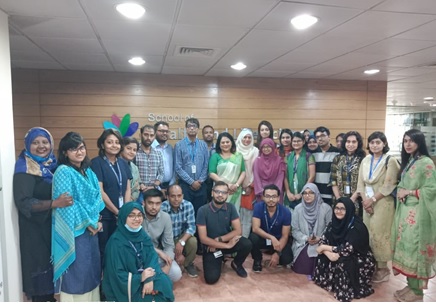 |
Participants of the workshop
Workshop on How to write a Policy Brief, hosted by ARCH, The Global Health Network
The ARCH hub, under The Global Health Network organized a series of workshops on “Communicating Science to Facilitate the Uptake of Research Findings into Policy and Practice, between 21 June 2022-7 July 2022. Under this programme, TGHN ASIA supported the ARCH hub in organizing one session on “How to write a policy brief”. The session was facilitated by Dr. Sohana Shafique, Assistant Scientist, and Deputy Project Coordinator of icddr,b who has vast experience in conducting policy analysis in Bangladesh. Participants from different fields including researchers, students, and stakeholders from different countries attended the session. It was an interactive workshop where Dr Shafique discussed with the audience regarding their queries and different aspects of the topic. For more details on upcoming sessions, please check the ARCH hub.
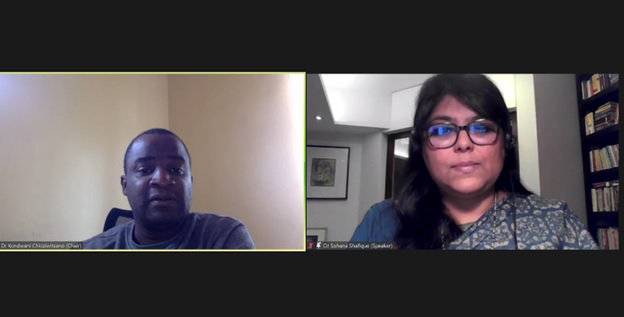 |
Writing a Policy Brief
May 2022
Prof Trudie Lang and Liam Boggs visit to Bangladesh: Setting up a preparatory plan for The Global Health Network Asia
Professor Trudie Lang, Director of the Global Health Network, and Liam Boggs, Senior Operations Manager from the University of Oxford visited Bangladesh from 21st to 24th May 2022 to discuss the future action plan of TGHN Asia.
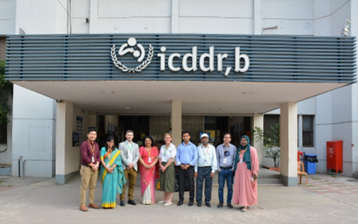 |
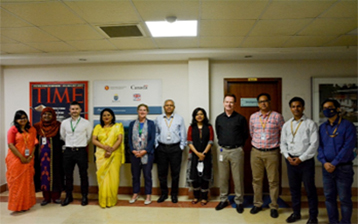 |
During the visit, Trudie, Liam, and the TGHN Asia team met The Executive Director of icddr,b, and a few members of the Central Management team including Thomas Liam Berry, Director of Finance, Armana Ahmed, Head, Research Administration, and, Md. Al Mamun, Manager, Library and Information Services along with Dr. Aliya Naheed, Scientist, icddr,b, and the Regional Lead, The Global Health Network, Asia, and her team. Prof. Trudie shared the overall plan of the project and share the action plan for TGHN Asia to get feedback. Recommendations on how the activities of TGHN Asia can be aligned with the existing policy of icddr,b were made during the brainstorming sessions with the dignitaries.
Professor Trudie also visited the Dhaka hospital, the only hospital in the entire world dedicated to diarrheal treatment along with the TGHN team. One of the medical officers of icddr,b shared the overall management system of the hospital, different departments, and ongoing research work. Professor Trudie discussed further capacity-strengthening opportunities, particularly for the nurses who are working enormously with the doctors and can contribute effectively to the research.
Exploring policymakers’ views on the capacity-strengthening initiatives
To initiate the activities of the TGHN Asia under the Bill and Melinda Gates Funded Project "A New Ecosystem for Health Research and Data Science", Professor Trudie Lang, Director of TGHN, and Dr. Aliya Naheed, Regional Lead of TGHN Asia in Bangladesh, along with their teams met different policymakers of Bangladesh. The team visited Professor Modasser Ali, Chairman of the Bangladesh Medical Research Council and Professor Robed Amin, Line Director of NCDCP, and a few Program Managers. In both meetings they discussed the willingness of the Bangladesh government in enhancing research capacity and developing a system for real-time data capture. They also discussed on the scope of collaboration to expand the network’s activity.
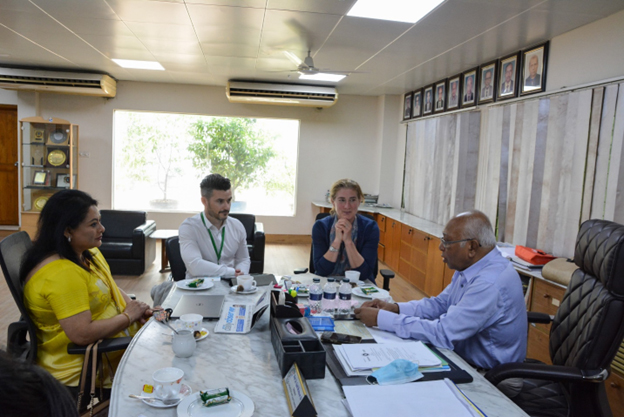 |
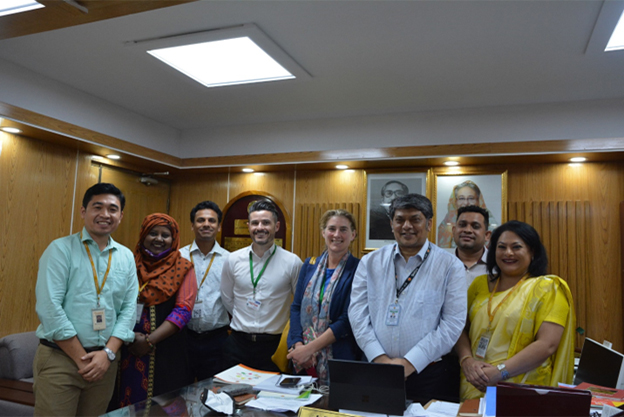 |
Brainstorming sessions on future pathfinder projects in TGHN Asia
Professor Trudie and Liam, along with the TGHN Asia team, visited Matlab HDSS run by icddr,b, the longest-running health demographic surveillance system in an LMIC setting. During the visit, the team explored the data capture system of the HDSS, and opportunities to add health data linking with the existing system with a clear purpose. Professor Trudie also suggested the Matlab team look for funding opportunities to generate tools, templates, and training manuals needed to set up an HDSS in low-resource settings. She also requested the Matlab HDSS team to identify the specific challenges in capturing these data and then generating usable outputs from this health surveillance data that can be taken up so that others so can set up the same in their settings.
Meeting with Bangabandhu Sheikh Mujib Medical University Hospital
Prof Trudie, Liam, Dr. Aliya along with her team visited BSMMU for a meeting with the Vice-Chancellor (BSMMU) and other dignitaries. This meeting was Inaugurated by Professor Sharfuddin Ahmed, Vice-Chancellor of BSMMU, and Chaired by Professor Md Zahid Hussain, Pro-Vice Chancellor, Research and Development, BSMMU. The meeting was also attended by senior professors of various departments of BSMMU. Dr. Aliya and Prof Trudie briefed the overall activities of TGHN-Asia and capacity building opportunities specially for the health care provider at BSMMU.
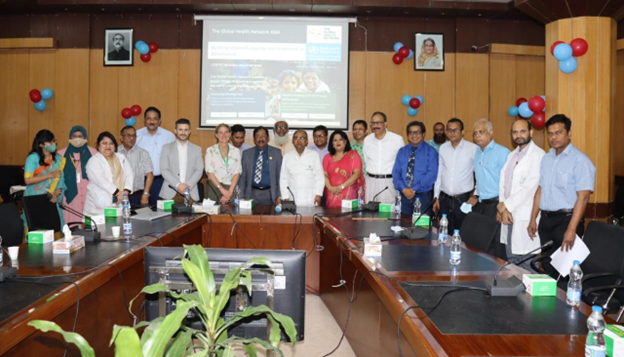 |
Meeting with the Scientists of the Noncommunicable Diseases consortium of iccdr,b
Another meeting was organized with the Scientists of the NCD consortium from various departments of icddr,b. In the meeting, all the attendees shared their views, how they can utilize the TGHN platform to increase their visibility with the global scientific community.
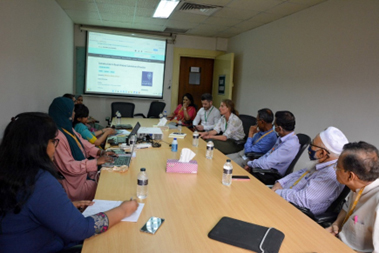 |